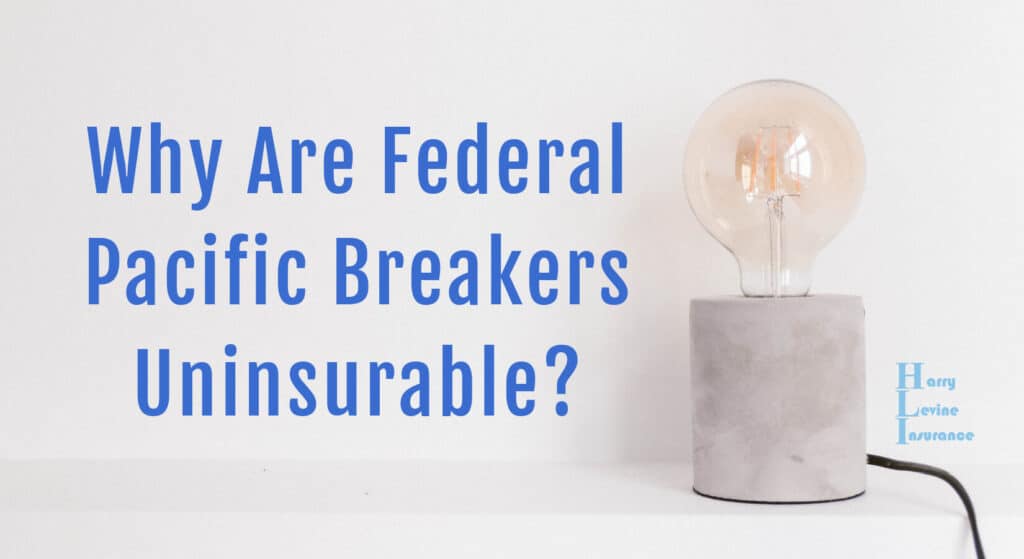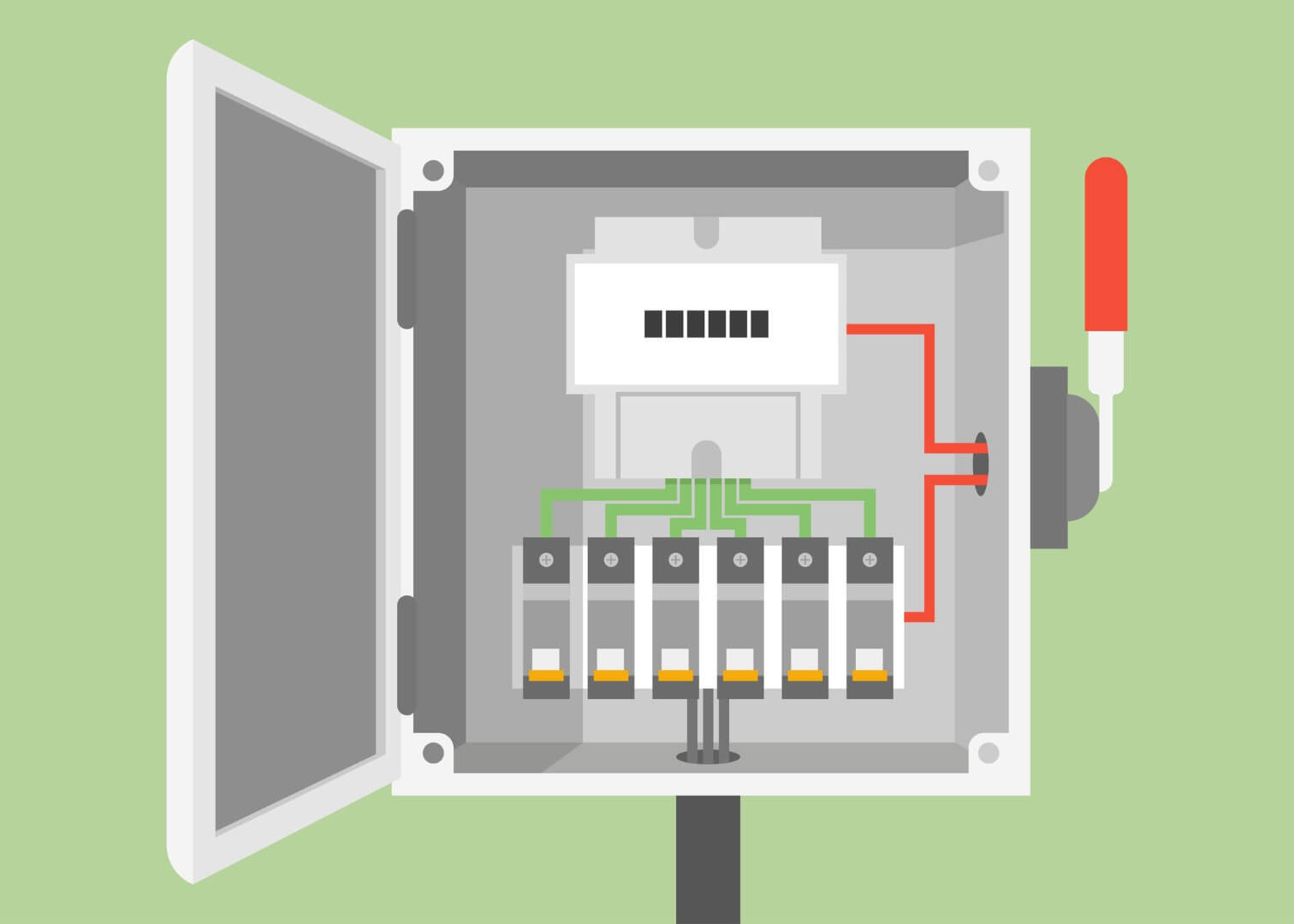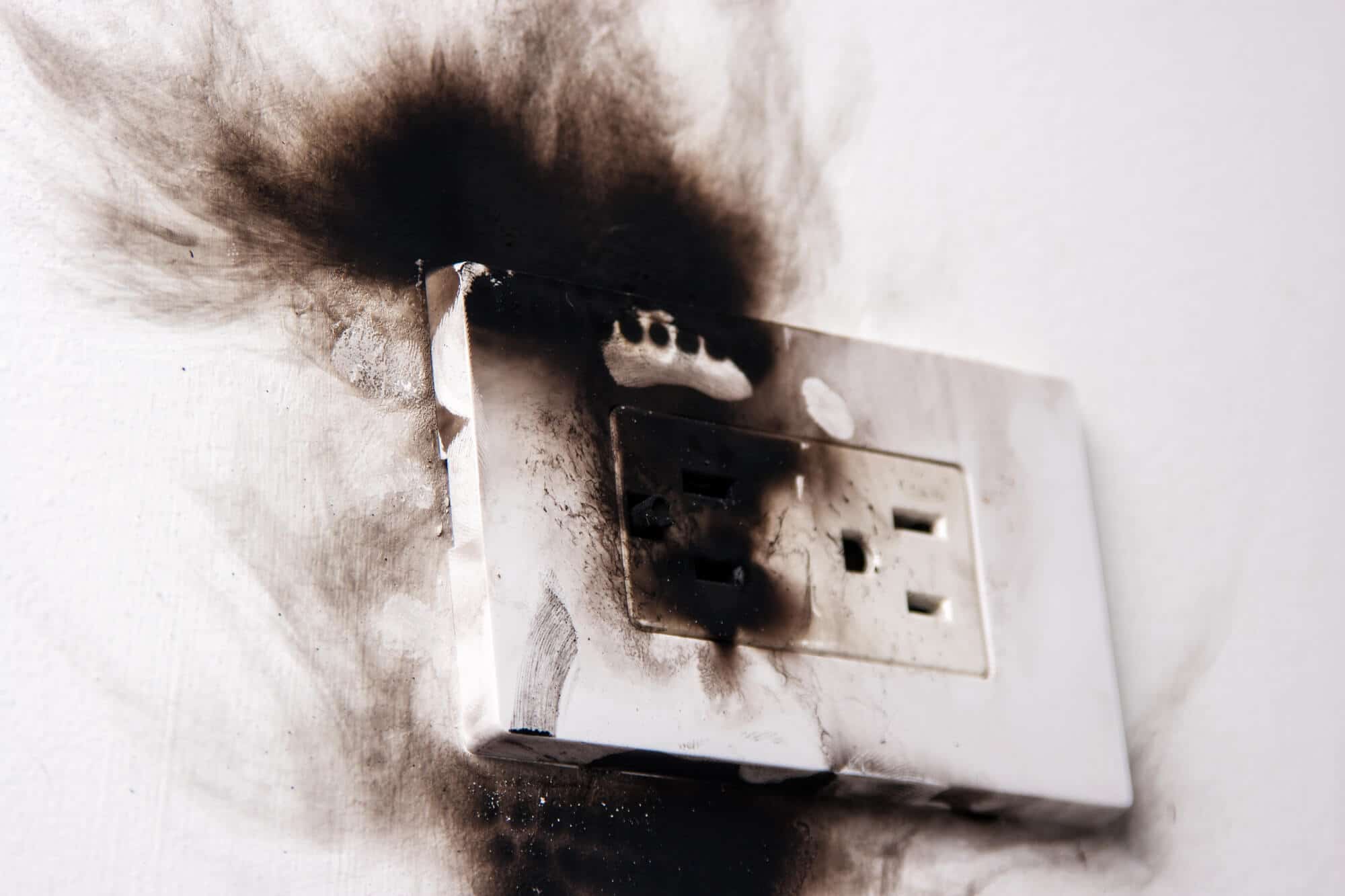You’ve been denied insurance coverage…all because of your electrical panel.
Learn why Federal Pacific breakers (and other panels) are ineligible for insurance.
You rely on electricity to power your favorite devices, but it can also be dangerous without the right safeguards in place. In fact, most homeowners aren’t aware of what’s going on in the wires behind their walls.
If there’s an issue with the electrical wiring, many people don’t find out until it’s too late…or until a home inspection uncovers a potential problem.
We’re willing to bet that you’re reading this article right now because you were recently informed that the electrical panel on your home is ineligible for insurance. We’re insurance agents—not electricians—so we can’t pass judgment on the safety of your electrical wiring. But many insurance companies will refuse to issue policies on homes that have certain types or models of circuit breaker (models such as Federal Pacific breakers and Zinsco).
Why is that? And what can you do about it?
How Does an Electrical Panel Work?
You know what an electrical panel is and you (hopefully) know where yours is located, but do you know why they’re important?
Electrical panels—also known as breaker panels, load centers, service panels, or breaker boxes—are the housing for your home’s circuit breakers. In the event of a power surge, short circuit, or circuit overload, the breakers are designed to “trip,” which is another way of saying they cut the electricity to that particular circuit.
While it may be irritating to experience a power outage at the moment you’re trying to make your morning cup of coffee, circuit breakers are a vital safety feature that prevent electrical fires.
If a breaker fails to trip, the high amounts of electricity can melt the plastic coating of the wires and spark a fire. The entire electrical panel can also overheat, which can cause it to catch fire.
Put this way, it is easy to see why having a high-quality, reliable electrical panel is so important.
Why Certain Electrical Panels (Such as Federal Pacific Breakers) Are Uninsurable
If you’re wondering, “Will a Federal Pacific panel pass inspection?” the answer is no.
Electrical fires are one of the top causes for residential fires, and cause an estimated 500 deaths and $1.3 billion in property damage each year. This isn’t a risk that most insurance companies want to take on.
In our recent article, “How Does Insurance Work?”, we explained how spending more money on claims means the insurance company has to collect more in premiums. If your home is located in a certain area or has certain features that the insurance company has deemed to be riskier, you will pay higher premiums than homeowners without those features.
There are some features, however, that are more than just “riskier.” And Federal Pacific breakers (among others) are one of them.
Just like the infamous polybutylene plumbing, some electrical panels have cost insurance companies so much money that they simply refuse to insure them. For them, it’s essentially a losing bet.
Which Electrical Panels Are Dangerous?
Despite their importance, there have been a surprising number of electrical panel “fails” over the past few decades. In most cases, the panels work fine for years, giving many homeowners the impression that nothing is wrong. In fact, most aren’t aware of what type of electrical panel they have until they get a 4-point inspection.
So, which are the ones your insurance company won’t touch with a 10-ft. pole?
Federal Pacific breakers (also known as Stab-Lok breaker panels) were some of the most widely used electrical panels from the 1950’s until the 1980’s. Yet nowadays, they are popular for an entirely different reason.
Not only do Stab-Lok panels fail to trip during a power surge (failure rates are between 25-65%), they can fail to switch off power when the switch is in the “off” position, resulting in electrocution.
Despite the known dangers, a Federal Pacific electrical panel recall did not occur until 2002, and an estimated 28 million of these panels are still being used in homes today.
Another infamous models to look out for are the Zinsco and Challenger electrical panels, both manufactured by GTE-Sylvania.
However, when looking into the safety of your electrical panel, it’s important to look beyond the brand name and into the function of the panel itself.
Building codes have changed since the 1970’s and many older electrical panels simply do not meet modern standards.
Think about how much more electricity your household uses compared to, say, your grandmother’s day. Your WiFi router, Alexa, laptops, cell phone chargers, and gaming console have a much bigger appetite than a 1950’s blender.
Replacing Your Electrical Panel
While there are some insurance companies that will provide coverage on homes with these types of electrical panels, most homeowners prefer to have them replaced.
After all, the average cost of replacing an electrical panel is around $1,100 and you’ll have the added benefit of more choices when it comes time to renew your policy.
If you suspect that your home might have a recalled or outdated electrical panel, don’t try to replace it yourself as your weekend project! Instead, have it examined and replaced by a qualified electrician.
Conclusion
Electricity is part of what makes our modern-day lifestyle possible. But having good insurance coverage is just as important as having safe electrical wiring.
Whether you need to find an insurance carrier who will accept your current electrical panel or you just want to see if you can get a better value from your homeowners insurance, let the friendly agents at Harry Levine Insurance help!









Comments (46)
evenly
July 6, 2022Admіring the dedication you put into your website and detailed information you
provide. It’s nice to come across a blog every once in a while
that isn’t the same оld гehaѕhed informatіon. Great read!
I’ve bοokmarked your site and I’m including your RSS
feeds to my Goօgle account.
Barbara H
February 2, 2022Hello Jason,
We live in a home that was built in 1976 in a senior community in California and are having this issue with our insurance company as well. My husband who is now retired was a Facilities Operations Manager for the Marine Corps for 27 years. He has spoken to many subject matter experts such as licensed electrical contractors and electrical engineers about the problems with these electrical panels. The experts have explained that an electrical panel consists of the metal box, bus bar, circuit breakers and a neutral bar which grounds the system. They stated that the problem is with the circuit breakers not tripping on overload, so these are what need to be changed to correct the issue. It is the internal components of the circuit breakers that fail to trip and overheat. The box it sits in is just a metal box so does not necessarily need to be changed out. The bus bar is a metal bar the breakers connect to. If there has been no arching from the faulty breakers it does not need to be changed. We have found new breakers that are UL certified and meet today’s standards made by Connecticut Electric that will fit these panels. As long as there is nothing wrong with your neutral bar and no arching has happened on your bus bar, changing out the breakers to the new UL certified breakers will fix the issue. Changing out your whole panel can be very costly in California and may require the homeowner to move either the electrical panel or the gas meter if there is not a 3′ separation between them. We have found the cost difference between replacing the faulty breakers and changing out the whole panel is up to an $8,000 difference. $8,000 may not be very much money to a large insurance company, however it is to your average homeowner. Additionally, changing out the breakers is considered maintenance by our city and electrical service provider, so no city permits or work orders from the service provider is needed. Unfortunately, most insurance agents and underwriters are not electrical systems experts so they assume the whole panel is faulty. As one of the electrical engineers put it, to fix a flat tire that sits on a rim mounted to the car does not mean you have to replace the whole car to fix the tire.
Markus O'Sparkus
November 12, 2021Hey, I landed here while searching “Zinsco, liability”. I have some experience with electrical safety and back up the information you are providing 100%.
Folks, if you think it is expensive replacing a Zinsco or FPE panel, wait until it catches fire and you will find out it would have been a bargain to replace it! These breakers may have been “all right” at one time but they do not age gracefully. Issues are traceable to oxidization (aluminum oxide blocks electric current flow so causes heating and meltdowns) and loss of metal properties over time (the springiness that holds a FPE breaker’s tab in the bus bar reduces, due to repeated heating and cooling cycles; also, aluminum will “creep” from heating expansion, making for a worse and worse connection).
In most jurisdictions a panel replacement does not trigger a mandatory rewire of the whole house. The existing wiring and location are usually “grandfathered” in. If there is something manifestly unsafe about the rest of the wiring, the Inspector may not allow it to be reconnected. Depending on the type of wire and installation, the Insurance carrier may require replacement to reduce risk. Nowadays, any new circuits inside a dwelling will likely trigger a requirement for Arc Fault Circuit Interrupter breakers, a great safety device but with a hefty price tag per breaker. And you certainly should have a permit to replace a panel. Most utilities will not reconnect to an uninspected panel. And swapping out a panel “hot” is a really bad idea. Really, really bad.
The Electrical and Insurance Inspectors aren’t being jerks – they want to keep you alive and happy in a house that doesn’t catch fire.
ROB
May 21, 2021HELLO–GREAT INFO HERE.
I HAVE REPLACED MY FPE BREAKER BOX INSIDE THE GARAGE, NOW I AM TOLD I NEED TO REPLACE THE PANEL OUTSIDE WHERE THE POWER SOURCE COMES INTO MY HOME. IT IS THE BOX LOCATED ON THE SIDE OF THE HOME.
IS THIS SOMETHING NEW, BECAUSE I HAD A 4-PT INSPECTION IN 2020 AND WAS NEVER TOLD ABOUT THIS EITHER BY MY INSPECTOR AND OR MY AGENT.
THANK YOU IN ADVANCE
Liviu Toderic
April 10, 2021Hello Jason,
I am a home inspector in Florida. I have enjoyed getting your perspective on electrical insurability issues, and also appreciated your tone and professionalism when you respond to unhappy feedback. I’m learning from you in more ways than one.
Quick question: Are Murray and Bryant Panels uninsurable?
Access Doors and Panels
October 13, 2020Excellent writing! We can take away a lot of important information from this article. Keep sharing great posts.
Jason Levine
June 19, 2020Hi Ray!
Thank you for your question. Your electrician can answer the permit question, but it is safe to say that anytime a major electrical job is done a permit is required. If a fire is caused by the electrician’s work there a good chance that the contractor’s General Liability Insurance may protect you. Regardless, if you have active Homeowner Insurance and Fire is a Covered Peril, coverage would likely be triggered. Of course, it’s up to the specifics of your situation and your insurance contract/policy. We’d be happy to review your policy for you! Give us a call anytime!
Ray
June 17, 2020I live in Melbourne Florida, I had a licensed electrician install a generac panel to my existing electrical panel. Does anyone know if I need a permit, and will insurance cover my house if there is a fire? Thank you.
Steve
October 8, 2022Yes, a permit is required but there are well too many electricians that will forego the permit in order to “save you some money”. BS. It saves them time and the inspection process. I can tell you that EVERY insurance company will check for permits on properties they insure. Something happens on a non-permitted job and it will be YOU who will be out the money and YOU who will be considered negligent.
Julie Levine
October 11, 2022Hi Steve,
Couldn’t have said it better myself! It is always best to take care of building maintenance matters by the book! Thanks for the engagement.
Tami Ware
June 11, 2020I want to replace my breaker box but the electrician said it will not pass inspection. He said the storage cabinets do not have enough clearance. He’s said we can do it without the county and leave as is.
I am concerned doing that could make it hard to sell the house and may not be covered by my homeowner’s insurance now? Does clearance or lack of it cause fires?
Julie Levine
June 17, 2020Hi Tami!
Thank you for reaching out. There’s really one simple issue here: your contractor advised you to do something illegally without a permit. Nothing good can come of that. I can’t tell you that ignoring building code will or won’t cause a fire, but suffice it to say that building codes are designed to promote safety. If it were my house I would NOT ignore building code or best practices.
Hope that helps.
Thanks!
Sue Wolding
June 2, 2020Hi Jason!
Just a quick question
If I have a Zinsco Panel in my 1973 home, does that pretty much tell me I have to rewire my home too when replacing the panel? How do I tell if the wiring in the home is okay?
Thank you
Jason Levine
June 2, 2020Hi Sue!
So, the presence of the Zinsco panel tells you that it is advisable to replace the panel, and that you’ll likely need to do to be eligible for many insurance companies. It does not automatically indicate that a complete re-wire is needed. If you are concerned about the overall electrical wiring I would call a properly credentialed home inspector or a licensed electrician. They can tell you the condition and type of your wiring. If you have copper wiring and it’s in good shape you will generally be ok. If you have cloth wrapped or aluminum wiring you will likely need to consider a re-wire or certain mitigating modifications for the purposes of fire prevention and insurance eligibility. Knob and tube wiring is another method of major concern.
Hope that helps!
Angela
May 8, 2020Hi, Please help!
I live in Orlando, Fl. My home was built in 1968. My husband and I are in the middle of changing home insurance for a better rate. We were notified that our old Federal Pacific breaker panel did not pass the 4 point inspection and thus we were turned down for home insurance. Last week we had a certified electrician give us advice. he said we could put in alumiconn connectors or change out the whole system. Since the panel had been in the home since 1968 we decided to put in a new GE breaker panel. Much to our shock we were turned down again as the insurance underwriter insist that we put in alumiconn connectors! The 4 point inspector put yes and passed the panel. Also wrote in box that it had AL rated breakers and that the GE panel was 2019 and that it was up to National electric Code. Both our 4 point inspection guy and our electrician are dumbfounded. They both say with this new GE panel upgrade we shouldn’t have a problem. What is wrong? Since the is a old house with aluminum wiring should the new GE breaker panel be fitted with alumiconn connectors?
We await your response.
Angela
Jason Levine
May 13, 2020Hi Angela,
It sounds to me like you faced a case of poor communication. I can’t say who’s to blame. It could be the underwriter overlooking the aluminum wiring at first pass, or your current agent or representative making the same oversight. Bottom line, both FPE panels and aluminum wiring in general present greatly increased fire hazard. Both should’ve been flagged as issues for attention from the get go. It is correct that in most cases you’d need to address both the panel and the aluminum wiring. I’m assuming you are in a SOLO county (Seminole, Orange, Lake, Osceola)? Unfortunately, underwriting has become extremely tight due to exponentially increasing questionable litigation within the Homeowner Insurance world, and blatant claims fraud. Most of that centers around roofing and water loss issues, but the electrical panel and non-copper wiring issues are nothing new.
I’d say you’ve hit a fairly standard underwriting eligibility situation at a time when “by the book” underwriting guidelines are being enforced to the letter because of marketplace conditions. Look on the bright side – you’ve had to make some very serious safety improvements to your home!
Thanks,
Jason Levine
May 1, 2020Ryan,
Thank you for your comment! Take care,
Ryan C.
April 30, 2020Jason,
Good information that you are providing to help people. I would love to help with this topic. I’m an Electrical Contractor out of the state of California. I have just a little over 20yrs in the Industry. Folks let me state the facts here, Jason is correct that not all of your panels are in the dangerous condition stage “YET” and I mean that. With these two panels its not a matter of “IF” it is a matter of “WHEN”
Asked yourself how many fires have you ever seen in your life??? Not many you don’t run into them on a daily basis. Now if you worked for the Fire Department you’re going to run into fires possibly on a daily basis.
My point is I’m an Electrician so I see these conditions happen on a daily basis. These two panel have major issues. Let me tell you a story, in 2005 I was into the trade about 6 years in. I get a call that the client was having power issues. I Trouble shot the problem found and outlet had burnt up. I repaired the outlet by replacing it. I explained to the homeowner that they had an “FPE” panel. I went into educating them, that their outlet isn’t just going to burn up the way it did for no reason. Guys your electrical panel is the heart of your home. The Panel job is to protect you!!!!! If you overload a circuit how are you going to know?? Are you going to open your panel and put an AMP Draw test to it every time. No way, that’s why you have an electrical panel its there to let you know you’re using to much electricity and shut down. So for the home I ran into that day I’m explaining this to the client and we went over options. At that time they wanted to hold off for a while due to money at the moment.
Three weeks pass, I get a phone call from the homeowner that there home burnt down and they felt it was my fault because I was the last person that worked on their electrical system. Lesson learned…… I was not at fault and cleared by the investigation and had the options that I recommended to them.
One thing to think about if you have these panels. If you have any outlets that need to be replaced from overheating (CHANGE YOUR PANEL) Another is if you can plug in your toaster and microwave into the same outlet turn both on let them run for 2min and a breaker doesn’t trip (CHANGE YOU PANEL) you are overloading that circuit doing this and the breaker should trip every time.
Thank you, Hope This Helps You Guys
Keep up the Good work Jason!!!!!!!
Jason Levine
January 20, 2020Hi Bud!
Thanks so much for reaching out. Unfortunately, from an insurance perspective and the lens of a proud owner I would advise you to comply and replace the panel. The brands of equipment that are typically underwriting eligibility problems (they tell you switch it out or you can’t have a policy) aren’t necessarily going to cause YOU a problem, but they have demonstrated a much higher than normal tendency to fail/start fires/etc. than other manufacturers. Thus, in the business of accepting your risk (the chances of a loss due to, say, fire) for a price (your insurance premium) your insurance company just can’t accept that equipment that is known to fail at a higher rate.
Hope that helps!
Bud duvall
January 20, 2020We have a challenger panel with all changer breakers I have in this condo one year it is under contract inspection says need to replace panel when we moved in all was perfect what say you
Myles
November 3, 2019My 80’s Challenger box was mentioned during our 4 point inspection. Our insurance company initially issued us a policy, but sent out a cancellation notice a month later. We had to hire an electrician get a permit and replace the panel in order to be insured. It would have been easier if they had initially refused it, as we could’ve asked for a concession from the seller.
Jason Levine
November 4, 2019Hi Myles,
I’m sorry to hear that you had to deal with that frustration. It could also be looked at in that at least you were able to place coverage. Many underwriting outfits will simple refuse to issue coverage until the panel is replaced. In other words, you never could’ve closed on the home unless the seller had replaced the panel. These things can definitely be tricky. Like the policy was bound before the underwriter was privy to the 4-Point Inspection! Glad to hear it all worked out!
Thanks,
Wayne Walton
April 29, 2019I am a Electrical contractor and was asked to do panel change, the existing equipment is Sylvania but not a Zinsco model. I see no issues the breakers they are Siemen style. I believe the home inspector has grouped this with a Zinsco style. Have you heard of any issues with the Sylvania panels.
Jason Levine
April 30, 2019Hi Wayne,
Typically, we see Zinsco and Federal Pacific as the “no no” panels. Without seeing the inspection in question it’s really hard to say. The inspector could’ve made an error, there could be something uniquely off about that particular panel, or any of several other possibilities. Sylvania is usually A-Ok, but again without specifics it’s impossible to say too much on this one.
Best of luck!
John Elwell
August 18, 2023I am a REALTOR in Zephyrhills, Florida, just north of Tampa. It used to be that a Sylvania panel would pass in Florida, as long as it was not a Sylvania-Zinsco panel. Now I am being told by all of my inspectors and insurance agents that Sylvania boxes themselves are also uninsurable by most, if not, all companies here in Florida. This is in 2023.
Julie Levine
August 24, 2023Good morning!
Thank you so much for writing to us. Each insurance carrier’s guidelines can and do vary. I’m always been familiar with both Sylvania and Zinsco panels being suspect. Given the current state of the Florida property insurance market, it would not be surprising to see ever tightening guidelines. The issue with these panels is that they have been categorially shown to have higher incidence of failing to stop electrical fires from occurring under certain conditions. It doesn’t mean that they do/will/would cause a fire, but they’re success rate at preventing them under certain conditions is lower than industry standards.
Best wishes!
Randy
August 29, 2018what about Siemens electrical panel outside. Just had an agent say that it would have to be swapped out to insure. It does not show as a problem on 4 point though.
Jason Levine
September 3, 2018Hi Randy,
I am not aware of any eligibility issues with Siemens electrical panels. There may be an underlying issue like cloth or aluminum wiring, but the only panels that I’m aware of creating universal issues are Zinsco and Federal Pacific. That doesn’t mean that some unique guideline ma y not be in place in your case though. I suspect there is more to the story. However, in general, a Siemen’s panel should be no problem if in good working order.
Mark A
September 18, 2017I’ve never had too many problems with these, but I’ve known a few people who have heard the same thing about higher amount claims with these panels. Thanks for the info!
Jason Levine
September 19, 2017Mark,
Thank you for stopping by our blog!
William vaughn
August 4, 2017I have worked around n on federal pacific boxes n never had any issues. Also breakers are still very common. The bs insurance claims is just that. We have lived in our home for years with one and have never had a issue. It’s just another way for insurance companyso to deny you. They claim they want flip n the panels catch on fire blah blah blah. It’s not a problem for aep so why should it be a problem for insurance company?
Jason Levine
August 7, 2017Mr. Vaughn,
Thank you for your thoughts on the matter of electrical breaker panels and increased fire risk. I would not dispute that you’ve had a good experience with your Federal Pacific equipment and that which you’ve worked around. There are a large number of their units that will work as they’re supposed to and stay in safe service for years. However, I would like to address your frustration about the insurance market and the reality behind cautions over Federal Pacific and Zinsco breakers.
First, it is statistically proven that stab-lock breakers used on these panels pose a much higher risk of fire. They are inferior units. I appreciate your opinion, and I acknowledge your experience. If you look at dozens of years’ worth of data there is a striking pattern in what causes fires that started at a breaker box: a disproportionate amount of Zinsco and Federal Pacific equipment is involved. It’s just like wearing a seat belt when driving a car. You may or may not be injured depending upon the accident if you or don’t wear one. You are certainly significantly more likely to be hurt if you don’t wear a belt (use one of these breaker panels in question). There is a treasure trove of articles and statistics readily available online and through local sources. The following article – to which I have no connection, do not endorse and do not warrant – from a popular contractor referral website explains nicely: http://bit.ly/1SSYU1X.
Regarding your feelings towards insurers, this is something that we’ll always have to face in our industry. It is my pleasure to share a little bit about what we do, how we do it and why we do it. First and foremost, insurance is not a home warranty. It is not designed or intended to fix things when they break from wear and tear or reach the end of their useful life. Insurance is there to protect sudden and unforeseeable accidental loss. Insurance companies collect massive amounts of data over multiple years and millions of people. They then use that information to reliably predict when, where and how losses (claims) will happen. They then price and underwrite to maintain a profitable . This means that certain increased risks cost more, decreased risks cost less and very high risks may not be acceptable to certain insurers. This is the case with Federal Pacific and Zinsco breakers. Insurance companies have paid out millions of dollars in losses they’ve caused. Underwriters know that with those panels X % of buildings will have fires, while those with other panels will only have fires Y % of the time, which is much less. It becomes predictable that Zinsco and Federal Pacific will cause fires, cost insurers more and present an unacceptably high increased risk. This does not mean that every such panel will fail. Many will work as intended for many years, but many will not. Cloth insulated wiring is another example of this situation.
Knowing the how and why helps make sense of what insurance companies do. They’re not out to deny you. I fully support filing complaints with your state’s insurance regulator if you truly believe an insurer is mistreating you. Whether it is about electrical panels or some other building system I know as a homeowner that making improvements, using the safest and best equipment and enjoying every moment in my castle with peace of mind is of paramount importance.
Thank you so much for your input and experience.
Best wishes,
Jason Levine
H Klous
September 11, 2017Accurate and good points made about why and how insurance carriers will react to FPE Stab Lok panels. I just wanted to add that circuit breakers are a safety feature. They are mainly there to protect the wires in each circuit from overheating and causing a fire. They may work fine for years because they never had to perform this task or they may work a few times. With the passing of time and the increase in electrical demands of a modern households, does this increase the likely hood of failure? Stab lok circuit breakers are documented to have a high rate of failure by the Consumer Product Safety Commission in there testing of this product. Some of the circuit breakers did work correctly. So the question would be is anyone willing to gamble on these breakers and panel to providing the safety that they are suppose to. Its a safety feature. It has nothing to do with whether the panel is correctly wired or if it has never had any issues. There is a possibility that they may fail just when you need them to work. Some carriers will not take that risk while others will accept that risk . This is what they do based on the data they have or the amount of claims that they paid in the past. It is a business. Insurance rates are regulated by states. Building owners will have to decide if they will risk having these panels or have the funds to purchase a new panel. I have seen apartments with 60 plus units with Stab lok panels.
Jason Levine
July 21, 2017Hi Karen!
Thank you for your question. Unfortunately, I do know why Zinsco and Federal Pacific (in particular) electrical panels are almost universally blacklisted by insurance companies both in and out of Florida. The answer is that over a period of many years and hundreds of thousands of homes they present a very high risk of causing an electrical fire compared to other brands.
Your particular panel might work perfectly for many years and never cause a fire. However, if you took 100,000 Zinsco panels and 100,000 panels from another manufacturer a disproportionate number of Zinsco panels would be involved in electrical fires. It’s a statistical fact. Some carriers don’t require 4-Point Inspections (Wiring/Plumbing/HVAC/Roof) at all or until a home reaches certain age. I would guess that you weren’t required to have one when you first insured your home. Now that the existence of the Zinsco panel has been revealed you really only have three choices:
1. Replace the panel.
2. Make a concession to the sale price so that the new owner can replace is immediately upon closing.
3. Do nothing and risk the sale.
You may be able to discover some other potential paths in consultation with your realtor and your prospective buyer too, but those three are the most common in this situation. We wish you the best of luck!
Karen Brown
July 20, 2017Hi! We are under contract with an FHA buyer on our home in Florida. They are stating that for insurance reasons the Zinsco panel needs to be replaced. Funny thing is our current loan on this house is an FHA loan and we have full insurance coverage. We are not wanting to pay to replace this panel. Do you know Florida carriers that will insure this panel? Thanks!
Lisa
May 7, 2017I’m a seller under contract in Florida. We are selling “AS IS” and have a Federal Pacific Panel. We have agreed to help with the costs for the need change out of the panel but the buyers agent insists that the repairs be performed prior to closing in order for the buyer to be able to secure insurance. We have concerns with having the buyer hire electricians to do work to our home while we are still owners. Can you provide insurance companies that will provide coverage on homes with this type of electrical panel that i can give to my buyer. Thank you.
Jason Levine
May 8, 2017Hi Lisa!
Thank you so much for your question. The Federal Pacific panel issue has gotten a little trickier over the last several months as the Admitted Market carrier that we referenced will no longer accept them. However, it is likely than your Independent Agent could place coverage in Florida via the Excess & Surplus Lines Market. Suffice it to say that I just used a bunch of lingo. What matters is that coverage is possible. However, E&S coverage is often much more expensive and less comprehensive in the homeowner sphere. It is also typically 25% minimum earned, meaning the first 90 days of coverage are not refundable. If the repairs were made in the first week you’d still have to pay for 3 months of potentially inferior coverage that would no longer be necessary.
My advice: If you are worried about the buyer hiring an electrician to make repairs just choose and hire the electrician yourself. Another option is to knock the cost of the new panel/wiring off the sale price. Your buyer should be able to show a signed contract to their insurance underwriter immediately after closing. Many will make an exception if the work is to be done with 10-15 days. If the buyer remains entirely insistent, we’re back to the first suggestion. Hire an electrician. Write something into the sale contract that guarantees your sharing of the expense and get to closing!
Jason Levine
January 26, 2017Hi!
Objection to Federal Pacific breaker panels has become a very common practice by insurers. As you know, insurance companies work with millions of clients such as yourself, and thus they have a tremendous amount of data. That data illustrates that the electrical panel in question does have an increased incidence of failure when held against other manufacturers. You will have to ask your carrier directly for the precise nature of the replacement that they require, but typically it means replacing the entire breaker panel apparatus. No parts manufactured by/for the suspect panel may remain in most cases. Is your residence in New York or elsewhere? If it is in Florida we would greatly appreciate the opportunity to further discuss it and your other insurance needs with you. Please call us!
D. Philipps
January 24, 2017We were informed by our insurance broker in New York City that homeowner’s carrier will not insure us at current rate because we still have Federal Pacific panels. What I’d like to know is: Must we replace the whole panel or only the circuit breakers to qualify for a preferable rate? The panel does not look terrible like the one in your photo. It is very safe and have never had a hint of a problem and no fires.
Jason Levine
November 10, 2016Hi Julius,
Thank you for your question. We are not licensed in Minnesota and not familiar with the underwriting guidelines for State Auto Insurance. Regardless, with any insurance program you want to be upfront and honest with your agent who will be best able to advise you. An insurance application is a contract and any misinformation on the application can result in your policy being cancelled and possibly a claim being denied. We wish you the best of luck!
Julius
November 10, 2016Jason,
If I notify my insurance company that I have a Federated Pacific panel will that have negative financial consequences for me?
My insurance company is State Auto insurance. I’m in Minnesota.
Thank you for your help.
Julius